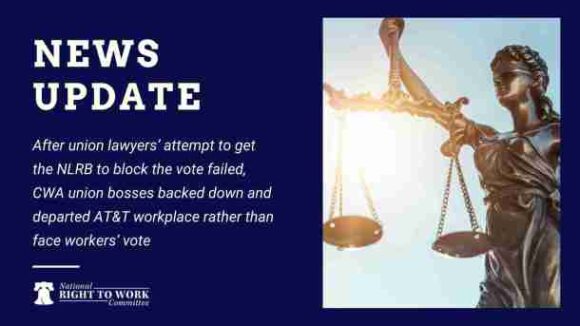‘People Have a Right to Make Their Own Choice’
Avelo employee Kim Howard believes all the firm’s flight attendants should get to vote on continued AFA rule. Credit: WTNH-TV (ABC,…
Union bosses have little or no respect for constitutional or individual rights. From efforts to force all workers to pay union dues or fees as a condition of getting or keeping a job, eliminating the secret ballot election for workers, and now promoting a bill in Washington State that violates the free speech rights of employers to speak to their employees, Big Labor is pushing an agenda that simply tramples individual freedom. The Washington State “gag bill” goes so far that the usually forced-unionism biased Seattle Times is calling for its defeat:
ORGANIZED labor is asking for a state law to restrict a company’s ability to talk to its employees. It is a bad idea, and should be rejected.
The bill has been introduced by Rep. Mike Sells, D-Everett, as House Bill 1528 and by Sen. Margarita Prentice, D-Renton, as Senate Bill 5446. It declares that if an employer calls a meeting, employees have a right not to attend if they have a “reasonable belief” that it is about religious or political matters.
In America, religious and political beliefs are private, and employers generally have no reason to hold meetings about them. The key to understanding this bill is that it defines political matters to include things “directly related to” labor unions. The bill’s real purpose is to undermine meetings employers call when they are in a fight with a union.
Under federal law, an employer is free to try to persuade employees to think and vote its way on a union issue, as long as it does not promise benefits or make threats. And, as a general rule of business, an employer is free to require employees to attend meetings.This bill would suspend that rule if the meetings were about union-related issues — pensions, the medical plan, a contract, union representation, etc. The bill disfavors speech about those issues. And that’s a free-speech problem, says First Amendment specialist Bruce Johnson of Seattle law firm Davis Wright Tremaine.
There is also a problem of federal pre-emption. Last year, the U.S. Supreme Court said in the case Chamber of Commerce v. Brown that labor law was turf belonging to Congress. It said that except for threats and promises, Congress wanted speech in this area to be unregulated. And a state legislature cannot overrule Congress.
Beyond these legal arguments is the sense of the thing. A company should be able to tell its employees what it thinks about a contract offer or what union representation entails. The employees don’t need to be shielded against what the boss thinks other than the shield they already have against his threats and promises. They can think the way they want and vote the way they want.
This bill is entirely one-sided: It restricts employers but not unions. It tilts the balance in a way that has not been done in any other state. And already Washington is one of the most union-friendly states.
The Legislature should scrap this bill and focus on balancing the budget.

Avelo employee Kim Howard believes all the firm’s flight attendants should get to vote on continued AFA rule. Credit: WTNH-TV (ABC,…

California’s Big Labor-concocted A.B.5, signed into law by Gov. Gavin Newsom in 2019, made it almost impossible for workers and firms to bounce back after 2020’s COVID-19 lockdowns. Now Biden bureaucrats want to federalize A.B.5!

After union lawyers’ attempt to get the NLRB to block the vote failed, CWA union bosses backed down and departed AT&T workplace rather than face workers’ vote